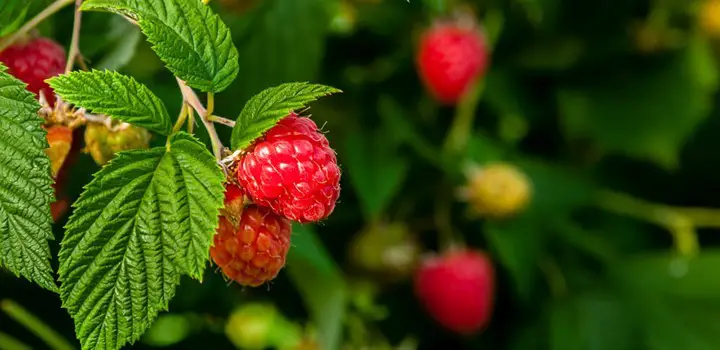Raspberry is an ever-present plant in our garden. Why? Because nothing matches with the taste of a freshly picked Raspberry. With proper care, fertilize them twice a year & you will see the result.
Interestingly, almost all the Berry fertilizers are quite good. And that’s a problem. How? Well, among so many good fertilizers, you face trouble picking the best one. But don’t worry. That’s why I am here. It would be a lot easier to pick the ideal one if you know what kind of fertilizers are perfect for Raspberries.
In short, any fertilizer that contains a higher Nitrogen & Potassium than Phosphorus, ensures both instant & slow feeding, keeps the soil acidic & supplies other macro & micronutrients, are perfect for Raspberries.
Good news, in this article you will get well-researched reviews of the 6 best fertilizers for any Raspberry variety like Black Raspberry, Red Raspberry, Wild Raspberry, Heritage Raspberry & so on.
So, without further ado, let’s get going.
Top 6 Fertilizer For Raspberries- Comparisons
| Fertilizer | NPK | Form | Type | Price |
|---|---|---|---|---|
| Espoma Holly-Tone Fertilizer | 4-3-4 | Granular | Organic | |
| Down To Earth Acid Fertilizer | 4-3-6 | Granular | Organic | |
| Espoma Fruit & Berry Food | 4-3-4 | Granular | Organic | |
| Miracle-Gro Edibles Plant Nutrition | 7-6-9 | Granular | Organic | |
| EcoScraps Berry Plant Food | 4-5-4 | Granular | Organic | |
| Dr. Earth Organic Acid Fertilizer | 3-4-3 | Granular | Organic |
Top 6 Fertilizer For Raspberries- Reviews
1. Espoma Holly-Tone Fertilizer
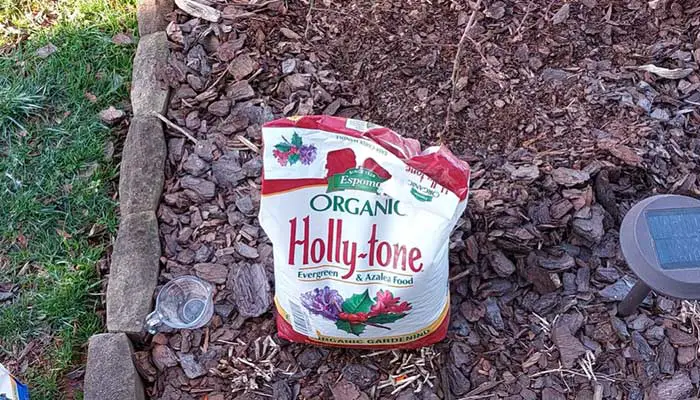
The Espoma company began its journey in 1929 & Holly-Tone is the number one selling product of this brand since 1940. From the last century & till today, Espoma Holly-Tone fertilizer has kept its worth as a wise choice for acid-loving & evergreen plants. No wonder it is the first product on my list!
Sources & Nutrients
Espoma brand is proudly walking forward with its organic line-up from day one. This fertilizer is no different than that. The company combines Feather Meal, Bone Meal, Poultry Manure, Alfalfa Meal, Greensand, Sulfate of Potash, Sulfate of Potash Magnesia & Elemental Sulfur to make this Raspberry food.
And all these sources combinedly supply 4% N, 3% P, 4% K, 5% Ca, 1% Mg & 5% S. You can see, both primary & secondary nutrients are present. But that’s not all. My research comes up with some micronutrients too. Apparently, the sources also supply Cu, Zn, B, Fe, Mn, Cl, Mo, etc.
Guaranteed Analysis
The NPK ratio of the fertilizer is 4-3-4. “Higher N & K than P”- the exact form of NPK required for Raspberries. Moreover, it contains 2.5% slow-release N & 1.5% instant-release N that keep feeding your Raspberries for up to 60 days.
Now you may ask about the higher amount of Ca & S since they are secondary nutrients & required in smaller quantities. Well, Along with feeding your Raspberries, Ca & S plays a secondary role here. They keep the soil acidic, just as your Raspberries prefer.
Striking Properties
Apart from Raspberries, the fertilizer is suitable for 38 more plants including, Rhodos, Camellias, Hydrangeas, Azaleas, Evergreens, etc. The list is quite long, right?
However, the number one striking feature is the exclusive BIO-TONE formula. This formula is a blend of 6 colony-forming soil bacteria that take care of your soil from the inside. It breaks down soil organic matter, makes the soil loose & thereby well-drained, keeps the soil fertile & so on.
And lastly, the fertilizer adds 1% humic acid to the soil so that the microbial activity & nutrient uptake capacity get a boost.
Applying Method
The fertilizer works best during the early spring & thereby has market recognition as the “Best spring fertilizer for Raspberries.”
Anyway, for potted Raspberries, Spatter 3 teaspoons for each 9″ pot diameter into the soil along the outer edge of the pot. After that, water thoroughly.
Finally, the perfect time for applying this fertilizer is once in early spring & again in late spring. For more details, check out the product label.
2. Down To Earth All Natural Acid Mix Fertilizer
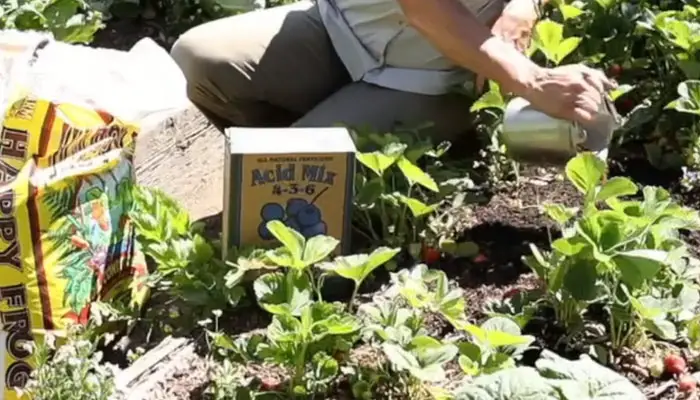
I don’t think you will find a more eco-friendly fertilizer than this. Down to Earth fertilizer company has used a 100% biodegradable paperboard box to packet the granules. But wait. Not only this, they even have used vegetable-based inks to print it. Amazing, right?
Sources & Nutrients
When I saw the “All Natural” tag on the product, I was interested in the sources. And I must say, the origins couldn’t be more natural. Look for yourself- Cottonseed Meal, Fish Bone Meal, Langbeinite, Rock Phosphate & Kelp Meal. Now you can understand why users call it the best natural fertilizer for Raspberries.
Furthermore, The NPK ratio of this acid mix is 4-3-6. That means it provides 4% N, 3% P & 6% K. Along with these primary nutrients, the fertilizer also supplies secondary nutrients (3% Ca, 2% Mg, 2% S) & micronutrients (Mn, Cu, Fe, Zn, etc.).
Guaranteed Analysis
With those natural sources, the nutrient composition seems just perfect for Raspberries. Besides, the fertilizer contains 3.6% water-insoluble N which are slow releaser & thus can feed your Raspberries for up to 3 months. So, if you were thinking about the lower amount of N than K, I want to clarify that it won’t make a difference due to Nitrogen’s continuous supply.
Striking Properties
The plant food has 2.5% humic acid derived from Leonardite. Humic acid increases growth during the establishment years by increasing microbial activity, nutrient uptake & organic content of the soil.
Applying Method
The fertilizer is recommended to use 3 times a year on Raspberries. First dose in early spring, the second dose in the blooming period & third dose in early fall. Sprinkle the granules evenly onto the soil maintaining the rate of 1 cup per plant. After that, work into the soil & water thoroughly.
3. Espoma Fruit & Berry Food
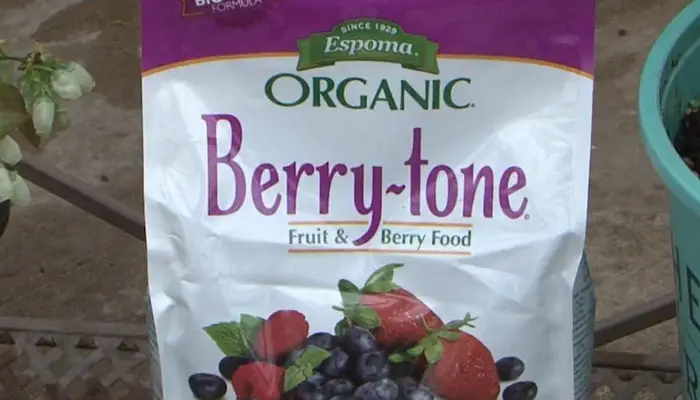
This plant food is a special treat for Berry growers. Espoma brand has come up with the perfect fertilizer for all the Berries including, Raspberries, Blueberries, Strawberries, Blackberries & titled it “Espoma Berry-Tone.”
Sources & Nutrients
The fertilizer has approval for organic gardening because it contains Feather Meal, Bone Meal, Poultry Manure, Alfalfa Meal, Greensand, Sulfate of Potash, Sulfate of Potash Magnesia & Elemental Sulfur as the sources.
The NPK ratio is 4-3-4 while the fertilizer also supplies 5% Ca, 1% Mg & 5% S & other micronutrients like Cu, Zn, B, Fe, Mn, Cl, Mo, etc.
Guaranteed Analysis
The fertilizer carries three types of N sources- Ammoniacal nitrogen (0.3%), Water-soluble N (1.2%) & Water-insoluble N (2.5%). Thus it ensures optimum uptake of N for a long time.
Other nutrients like P, K, Ca, S & Mg are in the appropriate amount for optimum growth & bigger Raspberry fruits.
Striking Properties
The first & foremost point is, this fertilizer is specially made for Berries by maintaining their requirements. Secondly, it contains BIO-TONE, an exclusive formula of beneficial soil bacteria. BIO-TONE helps in improving soil quality, soil structure, organic content, fertility & so on.
Furthermore, it bears 1% humic acid to nourish the soil by increasing its nutrient uptake capacity, organic content, drought tolerance, disease resistance & so on.
To sum up, it has all the properties that a Raspberry fertilizer should have & which makes it the recommended organic fertilizer for Raspberries.
Applying Method
First of all, draw the dripline & measure the diameter. The application rate is 1 cup per foot of drip line diameter. Sprinkle the granules following the dripline, mix with the soil & water thoroughly.
4. Miracle-Gro Performance Organics Edibles Plant Nutrition Granules
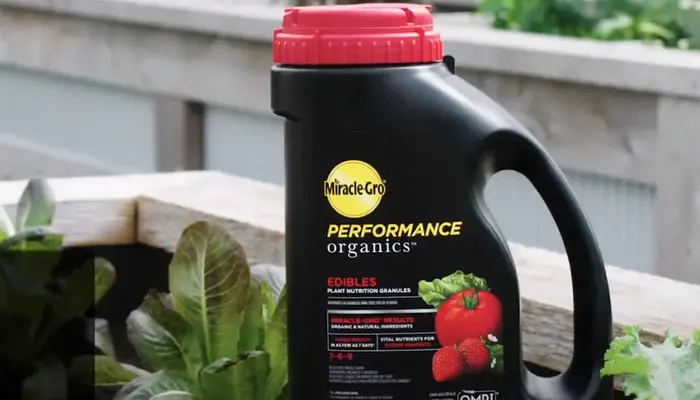
I won’t lie to you. The first thing that attracted me was the color of the bottle. No doubt, it is the most eye-catchy product on the market. Undeniably, Miracle-Gro is America’s favorite plant food brand. “Astonishing results, every time!”- as long as they are strict to their motto, we are happy.
Sources & Nutrients
The fertilizer is OMRI approved as the company has used all-natural & organic compounds like Soybean Meal, Nitrate of Soda, Bone Meal, Sunflower Hull Ash, Phosphate Rock & Sulfate of Potash.
And these sources combinedly supply 7% N, 6% P, 9% K, 6% Ca, 0.90% Mg & 1.20% S. But that’s not all. The compounds also provide micronutrients like Cu, Zn, Co, Fe, Mn, Mo, etc.
Guaranteed Analysis
The fertilizer offers a powerful NPK ratio with a high amount of Ca to keep both the soil & your plant healthy & happy. Besides, it contains N from four different sources & 5.29% of the total N is water-insoluble. That literally tells you not to worry about your Raspberry’s growth anymore.
Striking Properties
Along with Raspberries, this plant food is applicable for edible garden plants like tomatoes, vegetables, fruits, etc. One of the best features of this fertilizer is, you will notice a visible positive impact within 7 days after applying. And therefore, I am sure, at the end of the season, you will get a bigger harvest than ever.
Applying Method
The application rate for potted Raspberries is 6 tablespoons per 12″ pot. But to help your Raspberries for effective feeding, you may have to mix the fertilizer with the topsoil & then water properly.
5. EcoScraps For Organic Gardening Berry Plant Food

I don’t think a plant food company can come with a more eco-friendly design than Ecoscraps. This phenomenal company is on a mission to make sustainable living easier & probably that’s why this Berry plant food is a blend of food waste. What an excellent way to use the leftovers!
Sources & Nutrients
The fertilizer gives me a homey vibe. Think about it- if you were making your compost in the garden, you would be using all of the garden & kitchen leftovers. The company did the same. They have used Landfill Wastes, hydrolyzed Feather Meal, Bone Meal, Blood Meal, Compost, etc to make this Berry food.
And about the nutrient composition, the company only shared the NPK ratio, which is 4-5-4. That means the fertilizer supplies 4% N, 5% P & 4% K.
Guaranteed Analysis
Clearly, the first noticeable fact is the higher amount of P than N & K. First of all, it is not even that big a difference. Secondly, all 4% of N is water-insoluble & thereby, it feeds your Raspberries as long as Phosphorus does. So, no need to worry about it.
Striking Properties
This fertilizer contains all in one particle to feed all the Berries of your garden like Raspberries, Blueberries, Strawberries, etc. Moreover, the company has not used any poop in this fertilizer & they claim no bed smells & recommend it for indoor use.
Furthermore, each granule of this fertilizer is uniform in nutrient composition & which gives the surety of a clean & even impact on your Raspberries.
Applying Method
Sprinkle 1 cup granules over the soil of a 12″ Raspberry pot. After that, work on the soil slightly & water thoroughly. One application will keep feeding your Raspberries for nearly a month.
6. Dr. Earth Organic Acid Fertilizer

There is no industry in this world without competition. And it is not easy to take a position in any marketplace. But surprisingly, Dr. Earth has taken a notable place in the plant food industry within just 30 years. And that too is competing with several giants. So, what is their secret? let’s see-
Sources & Nutrients
The fertilizer is OMRI, CDFA & OIM approved for organic use as it is a mixture of 100% organic compounds like Alfalfa Meal, Fishbone Meal, Bone Meal, Feather Meal, Potassium Sulfate, Kelp Meal & Kelp Flour.
And about the nutrients, the company has declared 3% N, 4% P & 3% K only, but my research extends the list by including several essential nutrients like calcium, magnesium, iron, sodium, Iodine, Sulfur, Manganese, Zopper, Zinc, Sodium, etc.
Guaranteed Analysis
Like the previous one, the fertilizer contains a little higher Phosphorus than Nitrogen & Potassium. And it has taken care of by providing all 3% Nitrogen as water-insoluble to feed slowly & for a long time. Besides, the composition makes it a perfect fertilizer for Raspberries during their flowering stage.
Striking Properties
Not only Raspberries, but the plant food also takes care of all the acid-loving plants of your garden including, Azalea, Camellia, Rhododendron, Maple, Hollies, Blueberries, Evergreens, Gardenias & so on.
But that’s not the best part. The most premium feature is the presence of TruBiotic- a blend of beneficial soil microbes plus mycorrhizae. This broad-spectrum soil inoculant makes the soil rich in organic content, and increases microbial adaptivity & thus, brings back life to your garden soil.
Moreover, the fertilizer contains 11% humic acid to increase nutrient uptake capacity, microbial activity & drought tolerance of your garden soil.
Applying Method
Sprinkle 2 tablespoons for every gallon of potting soil every other month. After applying, mix the fertilizer with the soil & water thoroughly.
Raspberry’s Fertilizer Requirements
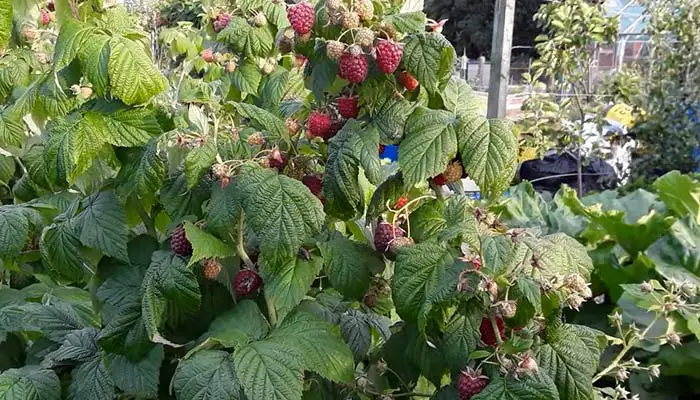
What is a good fertilizer for Raspberries? Interestingly, this particular question never gets off the table. But, if you know the requirements of your Raspberries, you will save some marathon research for sure.
You know, plants need almost 18 essential nutrients for a successful life cycle. But to be more specific, several scientists have found that Raspberries especially thrive for Nitrogen, Phosphorus, Potassium, Calcium, Magnesium, Sulfur, Iron, Boron, Manganese, Zinc, Copper & Molybdenum.
Therefore, look for a fertilizer that covers the list. The more nutrients it supplies, the better it works.
However, there is an issue with the NPK ratio of Raspberry fertilizers. Expert gardeners & local horticulturists always suggest a fertilizer with a higher quantity of Nitrogen & Potassium than Phosphorus.
Although, a balanced fertilizer is okay too. But, I prefer it as the second-best option. And finally, fertilizers that work perfectly for acidic soil are 100% suitable for Raspberries.
How Often To Fertilize Raspberry Plants
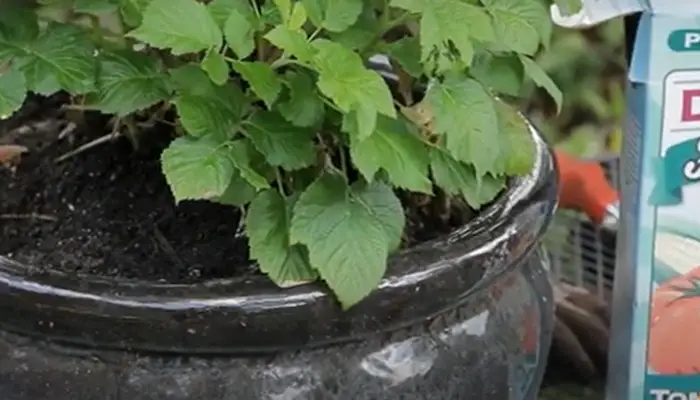
You know, there are two types of Raspberries-
- Summer-bearing Raspberries &
- Fall-bearing Raspberries
And the fertilizing schedule can be a little different according to the type of Raspberry plant you have.
For your concern, Summer-bearing Raspberries set fruits from late June to August on the previous year’s growth. On the other hand, Fall-bearing Raspberries show two crops, once during late summer on old wood & again during early fall in current years growth.
So, When To Fertilize Summer-bearing or Fall-Bearing Raspberries? Well, the best time to fertilize is in early spring. Both types of Raspberries show active growth during that time. But Fall-bearing Raspberries may need additional care for the second crop. Therefore, a good practice is to fertilize once again after the summer harvest.
To sum up, fertilize your Raspberries twice a year for continuous & bumper production of Berries.
How To Fertilize Raspberries
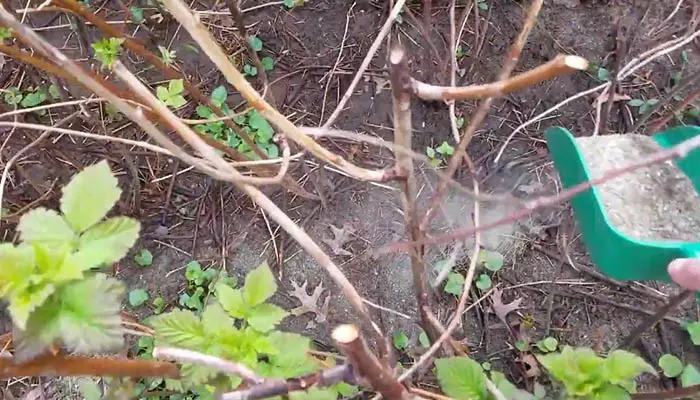
You see, I have suggested all the granular fertilizers for your Raspberries. And applying granular fertilizer is easy. You will find a detailed direction on the packet label. But follow my steps for a better understanding.
Steps
- First of all, read the packet label & find out on which basis the directions are provided. For example, it can be pot diameter, the quantity of potting soil, drip line diameter, or trunk diameter.
- Now choose the suitable one & measure accordingly. Let’s say, in the case of drip line diameter, draw the drip line first & then measure the diameter. For measuring trunk diameter, place the measuring tape 4-6 inches above the soil.
- After that, take the exact amount of granules & apply them to the soil as per direction. Normally, there are two standard ways to apply granules- either following the drip line only or spreading evenly inside the drip line circle. Find out which way your fertilizer prefers.
- The final step is, working on the topsoil for proper mixing & then watering.
Homemade Raspberry Fertilizer
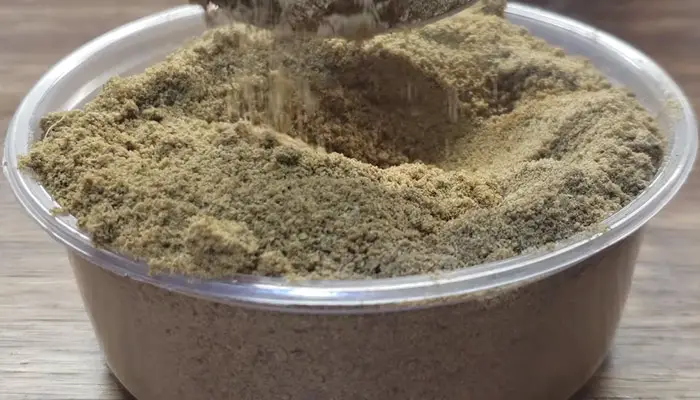
Ingredients:
- Canola Seed Meal
- Bone meal
- Dolomitic Lime
- Kelp Meal
Procedure
Mix 4 part Canola Seed Meal, 0.5 part Bone Meal, 1 part Dolomitic Lime & 1 part Kelp Meal together & there you go.
Applying Method
Apply this fertilizer in spring, especially after pruning & before new growth. Spread the fertilizer evenly onto the drip line circle & that’s it.
Note: This exclusive homemade blend adds Nitrogen, Phosphorus, Potassium, Calcium, Magnesium, Sulfur, Copper, Manganese, Sodium, Iron & Zinc to the soil & feeds your Raspberries efficiently.
How Do You Increase The Yield Of Raspberries
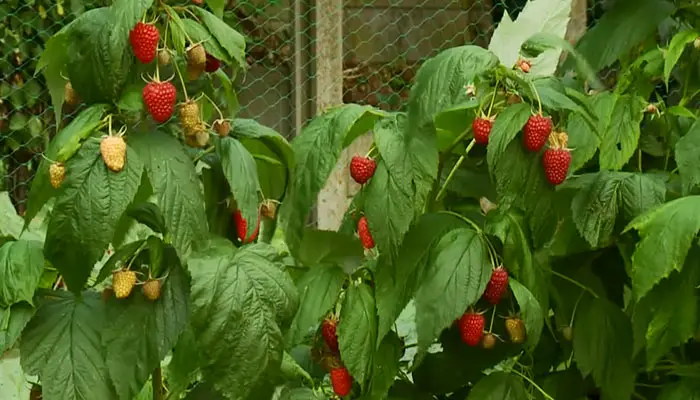
A perfect environment & continuous care makes a pleasant yield. But today, I am not going to discuss it all. Rather I will tell you 4 top-notch factors that will definitely increase the number & size of your Raspberries. Let’s go-
Sunlight
Raspberries require 6-8 hours of direct sunlight daily. And it is the preliminary condition to get a bumper yield of Raspberries. So, have it done.
Irrigation
Watering helps in two ways. It satisfies the thirsty Raspberry plant & aids in absorbing nutrients. Therefore, water your Raspberries properly at least twice a week during the growing season. Provide them 1-2″ of water weekly & up to 4″ during the harvesting period.
Fertilization
What & when are two very important questions for fertilizing Raspberries. Early spring fertilization with an accurate fertilizer can boost your Raspberry production to quite an extent.
Pruning
Pruning is the best way to increase Raspberries. But you must know which type of Raspberries you are growing. Because there are different pruning requirements for summer-bearing & fall-bearing Raspberries.
For summer-bearing Raspberries, prune the canes at chest level in late winter. But to get both crops from fall-bearing Raspberries, only prune the floricanes at the ground level in late winter. Nourish the primocanes & you will smile once in the summer & again in the fall.
Frequently Asked Questions
Is Miracle Grow Good For Raspberries?
Miracle-Gro Performance Organics Edibles Plant Nutrition Granules is an excellent choice for Raspberries. It comes with both instant & slow feeding processes that take care of your plants for a long time. Plus, the enhanced nutrient composition is just what your Raspberry plants need.
Are Coffee Grounds Good For Raspberry Plants?
Coffee grounds add N, P, K, Ca, Mg, B, Cu, Fe & Zn to the soil. Plus, it keeps the soil slightly acidic. And guess what? These nutrients & acidic soil rank on the requirement list of Raspberries.
Is Epsom Salt Good For Raspberry Plants?
Experienced gardeners have found that 2 teaspoons of Epsom salt per gallon of water are highly effective during the blooming stage of Raspberries. Epsom Salt supplies Mg & S to feed your Plants & keep the soil acidic a bit.
Is Chicken Manure Good For Raspberries?
Nitrogen, Phosphorous, Potassium, Calcium, Magnesium, Sulfur, Manganese, Copper, Zinc, Chlorine, Boron, Iron, and Molybdenum- this is the nutrient composition of chicken manure. Now, you tell me, is there any reason that it can’t be good? I don’t see one.
Is Blood Meal Good For Raspberries?
Blood meal is high in Nitrogen. And it also supplies Calcium, Sodium, Magnesium, and other trace minerals. Besides, it is a 100% organic source of nutrients. Therefore, I don’t see a single reason why it can’t be good for your Raspberries. Just make sure you don’t go overboard with the application rate.
Is Bone Meal Good For Raspberries?
I think you already know about this. Almost all the commercial fertilizers use bone meal to make their Raspberry blends. I don’t think they would use bone meal if it is not good. Who can avoid such a good source of Calcium, Phosphorus & other trace elements?
What Kind Of Soil Do Raspberries Like?
Raspberries Like acidic soil with a soil pH range of 5.6-6.2. Additionally, a good host of Raspberries is well-drained & organically rich sandy-loam soil.
Final Words
Have you noticed that I have listed only the organic fertilizers? Well, in the case of edibles, it is always better to use organic fertilizers. However, Raspberries are easy to grow, and don’t require much care. With a little effort, you can get mind-blowing rewards.
Therefore, don’t go careless with your plants. Fertilize them in time with the best fertilizer for Raspberries & that’s when my list will come in handy for you. I truly believe, before purchase, you have to think about these six because they are trending on the market & literally unavoidable.
Hopefully, you get the right one. Thanks for stopping by.
